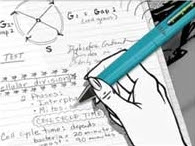book review
Miranda Hart's hilarious memoir offers candid insights about the many awkward moments we encounter in life
Author: Miranda Hart
Book: Is It Just Me?
After making her mark on television and gaining widespread popularity for her semi-autobiographical sitcom, British actress and comedian Miranda Hart has transformed her unique brand of comedy into a book with Is It Just Me?
The tome does not function as a chronological biography that follows her life from childhood to adulthood, but takes the shape of a “literary romp” through various issues, sprinkled with anecdotes from Miranda's life. Is It Just Me? takes a lighthearted look at navigating awkward social hiccups and handling scenarios one isn't taught how to deal with. Miranda wonders whether it's just her that repeatedly falls prey to embarrassment, ultimately coming to the conclusion that we all feel awkward to varying degrees and struggle in our own ways.
“The nub of life is surely negotiating and avoiding idiocy,” she states at the onset, and then goes on to discuss topics like music, office life, technology, beauty, health, holidays, pets, dating, and dreams. A number of embarrassing incidents are henceforth relayed, as she talks about her lack of the “muso gene”, the phenomenon of the abandonment of hobbies as a teenager and struggle with it thereafter, her favourite things about working in an office, and the indignities of the ageing process.
While much of the book is directed to her reader - or My Dear Reader Chum, as she puts it - there is also an occasional sidebar: Miranda's eighteen year old self intermittently pops up for a conversation with her current, grown up self, and is often appalled to find out how her life is going to turn out. Is It Just Me? eventually ends on an inspiring note, encouraging us to just “make the best of our lovely, wonky selves”. “We are all unique which makes us beautiful,” writes Miranda, before advising that it's always best to be who you are instead of trying to be something you're not.
As a “Miran-ual”, Is It Just Me? does what it sets out to do: offer candid insights about the many awkward moments we encounter in life. If you want a detailed account of Miranda's past, then that isn't what you'll find here; those looking for an in depth narrative about the life of the quirky comedian are likely to be disappointed with the book, although, to be fair, a detailed autobiography is not what this volume purports to be. Also, there may be some overlap in the material here and on her show, and at times you may wonder to what degree the material is being exaggerated for comedic effect. And although things conclude on an uplifting note, one can't help but notice that while the writer wants us to think that she is content with exactly how things have turned out for her, sometimes she does not sound entirely convincing.
Still, the style of writing is affable, and the frankness of the author makes it easy to cheer for her and relate to her. The content here may not always be side splittingly hilarious, but it is witty, lighthearted, and ultimately uplifting. Her self-deprecating sense of humour is endearing, and it also makes you think about your own life and realize that you really aren't alone - at one time or the other, all of us struggle with ourselves and the situations we find ourselves in. Overall, Is It Just Me? is a quick and amusing read, and while it isn't the most evenly written and well structured tome, it's still a warm and charming read, and fans of Miranda's style of humour are very likely to enjoy it.
- By Sameen Amer
Instep, The News on Sunday - 31st March, 2013













